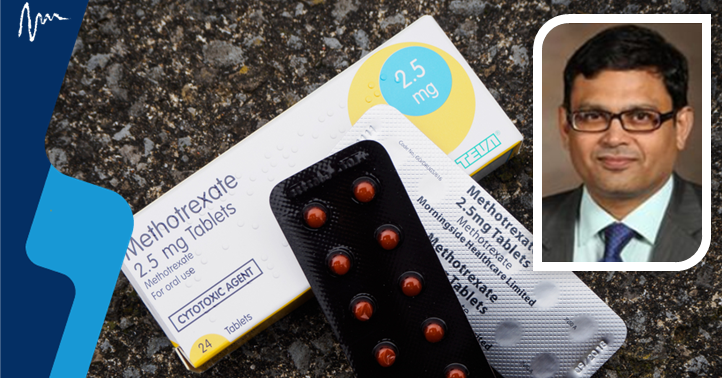'CIRT: Can low-dose methotrexate prevent atherosclerotic events?': Dr. Sundeep Mishra
M3 India Newsdesk Jan 14, 2019
Prof. Dr. Sundeep Mishra shares the learning from the Cardiovascular Inflammation Reduction Trial (CIRT) which was presented at the Annual AHA Meeting 2018 and sought to investigate whether suppression of inflammation with low-dose methotrexate could prevent cardiovascular events in patients with stable CV disease.

Atherosclerotic cardiovascular disease (ASCVD) is a lifestyle disease with multiple risk factors like smoking, diabetes mellitus, hypertension, obesity etc. Recently, even inflammation in the cardiovascular tree is postulated to play a crucial role in the development and progression of ASCVD. Pathologically, the co-occurrence of inflammatory endothelial injury and migration of low-density lipoprotein (LDL) particles into the vessel wall may trigger a cascade ultimately leading to the development of ASCVD.
Several epidemiological studies and a few clinical studies with statins and other lipid-lowering agents have suggested this link i.e. reduction of ASCVD by reducing both LDL-C and CRP levels. This anti-inflammatory effect of certain drugs like statins assumes even more significance in light of the availability of new drugs like inhibitors of proprotein convertase subtilisin/kexin type 9 (PCSK9) which significantly reduce LDL-C but have no effect on CRP levels.
The Cardiovascular Inflammation Reduction Trial
The CIRT (Cardiovascular Inflammation Reduction Trial) which was presented at the Annual AHA Meeting 2018 and published in the New England Journal of Medicine sought to investigate whether suppression of inflammation with low-dose methotrexate could prevent cardiovascular (CV) events in patients with stable CV disease.
It was a randomised, double-blind trial involving 4786 patients (median age 66 years, ~80% men) with previous myocardial infarction (MI, approximately 61%) or multivessel coronary artery disease (~39%) who also had either diabetes or metabolic syndrome.
The patients were randomized to receive either methotrexate (target dose 15 to 20 mg every week) or a matching placebo. The trial was stopped prematurely after a median follow-up of 2.3 years because it had crossed a pre-specified boundary for futility for both the original and revised primary end-points. The baseline median LDL-C level was ~68 mg/dL and high-sensitivity CRP was 1.5 mg/L.
Key findings:
- Treatment with methotrexate did not reduce levels of IL-1β, IL-6, or CRP
- Methotrexate also did not result in lower incidence of primary end-point (4.13 vs 4.31 per 100 person-years; hazard ratio 0.96; 95% confidence interval 0.79 to 1.16), as compared to placebo
- There was also no effect on individual components such as all-cause mortality and hospitalisation for heart failure
On the other hand, patients receiving methotrexate had a higher incidence of cancers, mainly non–basal-cell skin cancers as well as a higher incidence of several other adverse effects including mouth sores and oral pain, gastrointestinal disorders, unintended weight loss, elevation in liver enzymes and leukopenia.
Therefore, treatment with low-dose methotrexate among patients with stable CV disease did not reduce levels of inflammatory markers or the risk of major CV events but was associated with a higher incidence of adverse effects.
Lacunae in the field
Unfortunately, the effect of reducing inflammation but not LDL-C has also been controversial. Classical anti-inflammatory agents; steroids, COX-2 inhibitors, have been found to be either ineffective or associated with harm.
However, very recently, for the first time, CANTOS (Canakinumab Anti-inflammatory Thrombosis Outcomes Study) showed a significant reduction in CV events with canakinumab, a monoclonal antibody that selectively neutralizes interleukin-1β (IL-1β) but does not lower LDL-C or blood pressure. Unfortunately, canakinumab is very expensive, which greatly limits its widespread use for this purpose.
Methotrexate is another effective anti-inflammatory agent which is also relatively cheap. However, its use specifically for reducing vascular events among patients without underlying systemic inflammatory joint disorder had not been tested in a clinical trial.
What does this trial tell us?
The CIRT trial despite being negative provides a useful insight into the problem viz. that not any anti-inflammatory can be effective in ASCVD, rather it is mainly the IL-1β/IL-6 axis that is involved in atherogenesis, and therefore only agents effective against this pathway; canakinumab or colchicines might be effective to reduce the CV risk.
Disclaimer-The information and views set out in this article are those of the author(s) and do not necessarily reflect the official opinion of M3 India. Neither M3 India nor any person acting on their behalf may be held responsible for the use which may be made of the information contained therein.
The writer, Dr. Sundeep Mishra is a Professor of Cardiology.
-
Exclusive Write-ups & Webinars by KOLs
-
Daily Quiz by specialty
-
Paid Market Research Surveys
-
Case discussions, News & Journals' summaries